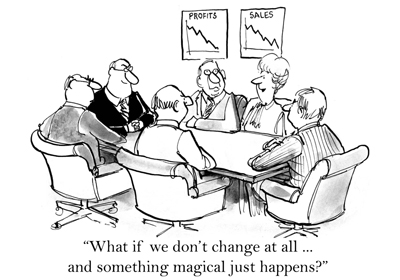Where is your organisation ‘located’? I don’t mean its geographical location, its files or its products and services. I’m asking where your organisation is ‘located’ in your mind and the minds of your colleagues, customers, competitors and suppliers. All organisations are ‘located’ in conversation – in how people think about and talk about them – and, more specifically, in an aspect of conversation called ‘listening’. This ‘listening’, already present before we speak, forms the glue that creates the reality of your organisation in everybody’s minds.
Why is this important to understand? Well, unexamined assumptions and beliefs limit people and organisations in many many ways. How you ‘listen’ determines how well you fulfil on your expectations for yourself, your people and your organisation. Because you listen all the time, you take your listening for granted, and how you listen becomes automatic. You are not likely to notice that how you listen can either keep things the way they are or merely improve on them. Creating change requires a new way to listen.
When you are aware that you listen automatically then you can choose how you listen: the automatic way, that improves on what exists; or a new way of listening – one that helps create change. So why do some changes seem so difficult? What blocks innovation; what stops us from creating change on a personal or an organisational scale?
Unexamined assumptions
Two competitive companies working on a joint project built a team of engineers from both companies. But nothing moved forward, and there was a lot of disagreement. When both teams were asked to think about the assumptions they brought to their new partnership, they discovered underlying judgments, evaluations and assessments like:
- They are our competitors – we can’t trust them.
- Our engineers are better than their engineers.
- We do things the right way; they do things wrong.
- Whatever we do, they’ll steal.
- We don’t really want to work with them.
- They are really the ‘enemy’.
No amount of effort could build teamwork on top of these unspoken assessments, on top of what each team member already ‘knew’. And what they already ‘knew’ shaped the future, because it shaped and determined their actions.
Unexamined assumptions such as the ones above form the culture of organisations. They colour and determine the future of work far more than anything you have to say, anything you know, or anything you might attempt. They are there when you join, or try to change anything, and over time you resign yourself to: ‘that’s the way it is around here’. This leaves you able to make only the kind of change that improves on what exists already rather than creating change consistent with what is needed in a rapidly changing world.
Automatic listening
Have you noticed that when someone starts to say something, you already have an impression of what it will be? Even when you enter a conversation intending to be open, generous and neutral, within seconds you react in predictable ways. Until you recognise this process in yourself it is difficult to have the freedom to choose another way to listen that allows for truly innovative solutions.
It’s as if you have antennae tuned like radar. Radar is very selective; it locates solid objects. Objects that are not solid don’t reflect the radar’s signal so, for example, it does not pick up wind. Like radar, automatic listening only picks up what it is designed to pick up. It works like a filter that rejects what does not ‘fit’ the design.
So, if you want to move beyond improving what exists and create something new, you have to find a new way to listen. That way, when someone says something that doesn’t fit with what you already know, it can register on your radar as a possibility rather than be rejected or reshaped. Until you get beyond automatic listening you are left with versions of what you already know.
Don’t get me wrong – sometimes improving on what’s already there is valuable and important. What we are discussing here, however, is a way to listen that creates entirely new possibilities.
Ideas developed from an original article by Melvyn L. Toomey of the Generative Leadership Group.
